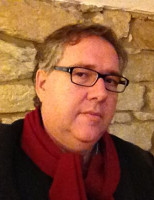Campo de’ Fiori (Aleksei Makushinsky) To the memory of Czeslaw Milosz I was on the Campo de’ Fiori
where the Giordano Bruno they burned
stands amidst a cheerful
and very lively crowd.
Here they still sell fish,
fruits and flowers,
as they did then, just after
the execution pyre went out. You recalled him in Warsaw,
in a great poem
of nineteen forty-three
looking at the carousel
revolving
so splendidly
to the animated strains of a polka
that drowned out the volleys
behind the nearby high wall of the ghetto. On Campo de’ Fiori,
when the market finishes,
with water from black hosepipes
stallholders wash away the refuse
of time and suffering.
Of those who were burned and of these
nothing remains, apart from
monuments and words. You thought about loneliness in death
watching the couples
cuddling together
flying up into the sky, laughing;
flakes of soot from the ghetto,
borne by the spring wind,
and someone caught them smartly,
like butterflies in flight. What remains of those ones?
The have also rotted away, you know.
And loneliness in death
overtook then with no trouble.
The tavernas are still open,
and a guiltless German accompanies
a frutti di mare pizza
with scarlet wine. Words come from that place
to which each one departs in silence.
Our language is alien to the departing
and they have no words for us.
Yet all the same words come,
shameless and merciless,
we catch them–flakes of soot
on dried-up lips. And what am I to do with them?
You saw, but I only remember,
sitting in the Campo de’ Fiori
on a calm March day.
Houses cluster round the square
and, flown here from the Tiber,
a hungry seagull
circles and cries. Giordano stands, hood
pulled over his eyes–he sees
other worlds, they are many,
their linkage is incomprehensible.
The fire that flies up into the sky
laughs, writhes and rages.
Campo de’ Fiori is everywhere, you see,
everywhere and forever. На Кампо ди Фьори Памяти Чеслава Милоша И я был на Кампо ди Фьори,
где сожженный Джордано Бруно
стоит посреди веселой
и очень живой толпы.
Здесь так же торгуют рыбой,
фруктами и цветами,
как торговали, едва лишь
после казни погас огонь. Ты вспомнил о нем в Варшаве,
в великом стихотворенье
сорок третьего года,
глядя на карусель,
кружившуюся так славно
под бойкие звуки польки,
что заглушала залпы
за ближней большой стеной гетто. На Кампо ди Фьори,
когда кончается рынок,
водою из черных шлангов
торговцы смывают сор
времени и страданья.
От тех сожженных и этих
ничего не осталось, кроме
памятников и слов. Об одиночестве в смерти
ты думал, глядя, как пары,
прижавшиеся друг к другу,
взлетают в небо, смеясь,
как хлопья сажи из гетто
приносит весенний ветер,
и кто-то их лихо ловит,
как бабочек, на лету. От этих-то что осталось?
Они ведь сгинули тоже.
И одиночество в смерти
настигло их без труда.
Таверны еще открыты,
и пиццу с фрутти ди маре
ни в чем не повинный немец
запивает алым вином. Слова приходят оттуда,
куда каждый уходит молча.
Язык наш чужд уходящим,
и слов у них нет для нас.
А все же слова приходят,
бесстыдно и беспощадно,
мы ловим их — хлопья сажи
на пересохших губах. И что же мне делать с ними?
Ты видел, а я лишь помню,
сидя на Кампо ди Фьори
мартовским мирным днем.
Дома обступают площадь,
и, залетевши с Тибра,
одна голодная чайка
кружится и кричит. Джордано стоит, надвинув
капюшон на глаза, — он видит
другие миры, их много,
их непостижима связь.
Огонь, взлетающий в небо,
смеется, бьется, ярится.
Ведь Кампо ди Фьори всюду,
всюду и навсегда. |

